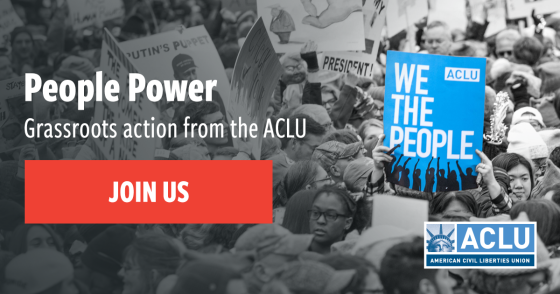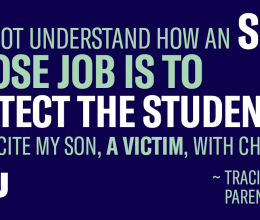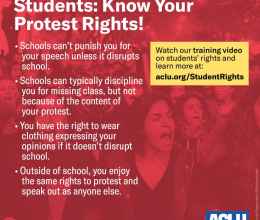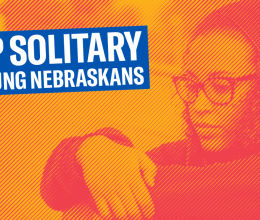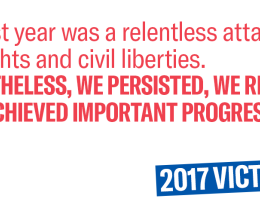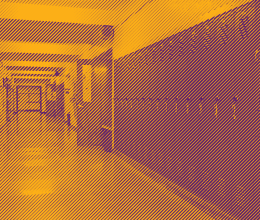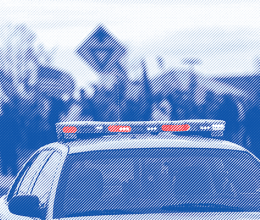
For Immediate Release:
December 20, 2018
Contacts:
Heidi Uhing Communications Director, 402-476-8091 ext. 104, huhing@aclunebraska.org
Media requests for Senator Pansing Brooks: Chris Triebsch, (402) 471-2633 or ppansingbrooks@leg.ne.gov
LINCOLN, Neb – Today the ACLU of Nebraska released a first of its kind investigative report detailing school police programs across Nebraska and analyzing their impact on students’ civil rights and civil liberties. "From the Classroom to the Courtroom: A Review of Nebraska's School Police Programs" is in response to intakes received by our office, recent local and national media and policy reports about the establishment or expansion of school police programs, an increased focus on school safety in the wake of tragedies, and an increased awareness about the devastating impacts of the school to prison pipeline.
The investigation was conducted in the summer and fall of 2018 with a series of open records requests to about 40 school districts and about 20 law enforcement agencies in Nebraska. Key findings include:
- According to the U.S. Department of Education’s Office for Civil Rights (OCR) data, during the 2015-2016 school year, 1,502 Nebraska students in public schools with school police were referred to law enforcement by their school.
- The OCR reports that Black students are more than twice as likely as their white peers to be arrested at school.
- Students with disabilities are far more likely to be arrested at school. Disabled students make up 12% of students in public schools, but 28% of arrests and referrals to law enforcement.
- 34 of Nebraska’s 250 school districts have established a permanent police presence in their schools and policies and practices to safeguard students’ civil rights and civil liberties and ensure meaningful parental involvement are widely divergent.
- 56% of Nebraska school districts responding to our open records request do not require that a parent be notified when their student is questioned about an incident at school.
"Every student should be able to learn in a safe environment free from racial inequities and biases. School hardening isn’t the best way to improve school safety. Positive alternatives to exclusionary punishments detailed in the guidance improve student achievement and make schools safer. Nationally and in Nebraska, a growing number of districts have started to establish or expand school police programs putting police officers on school grounds to patrol the hallways in response to national tragedies. Far too often, these well-intentioned programs can have troubling consequences. As a result of having a permanent police presence in schools, children are far more likely to be subject to school-based arrests for disciplinary matters, than they were a generation ago. A school-based arrest is the quickest route from the classroom to the courthouse. The time is right for Nebraskans to ask the hard questions about these programs and to work together to ensure the rights of Nebraska parents and kids are protected," said Rose Godinez, ACLU of Nebraska legal and policy counsel.
"I brought an interim study this year to initiate a statewide conversation about these critical issues as I was concerned about the high numbers of children entering the school-to-prison pipeline. I am pleased that this report clarifies the need for legislation to provide training resources and clarify roles between administrators, teachers and school resource officers. Law enforcement needs to be able to focus on school safety and not school discipline," said State Senator Patty Pansing Brooks.
"Nebraska schools need to be safe, welcoming and inclusive to ensure all our students fulfill their potential. The data presented in this report is shocking, but unfortunately, unsurprising. Kids of color and kids with disabilities are far more likely to experience law enforcement contact as a result of their normal teenage behavior. When lines are blurred between school disciplinary matters and law enforcement response, children lose the opportunity to just be students--imperfect, growing beings--and instead become suspects or criminals. The details in this report tell us we need to work even more urgently in structuring policies that ensure every child's rights are protected in the school environment," said Juliet Summers, policy coordinator at Voices for Children in Nebraska.
“The use of School Resource Officers dramatically increased in the 1990s, without a real check on the impact of increased police presence in our schools. A study by the Center for Evaluation and Education Policy at Indiana University found that schools with greater reliance on school expulsion and court referrals score lower on academic achievement tests, while policies that keep kids in the classroom produce better results for students, schools, and communities. The push of children to the judicial system for acts that would have previously been viewed as typical youth behavior masks the issue that our schools need resources to appropriately implement supports for special needs students, an issue the juvenile justice system is not well equipped to address,” said Christine Henningsen, project director at UNL's Center on Children, Families and the Law.
###
For over 50 years in Nebraska, the ACLU has worked in courts, legislatures, and communities to protect the constitutional and individual rights of all people. With a nationwide network of offices and millions of members and supporters, we take up the toughest civil liberties fights. Beyond one person, party, or side — we the people dare to create a more perfect union. Learn more at www.aclunebraska.org
